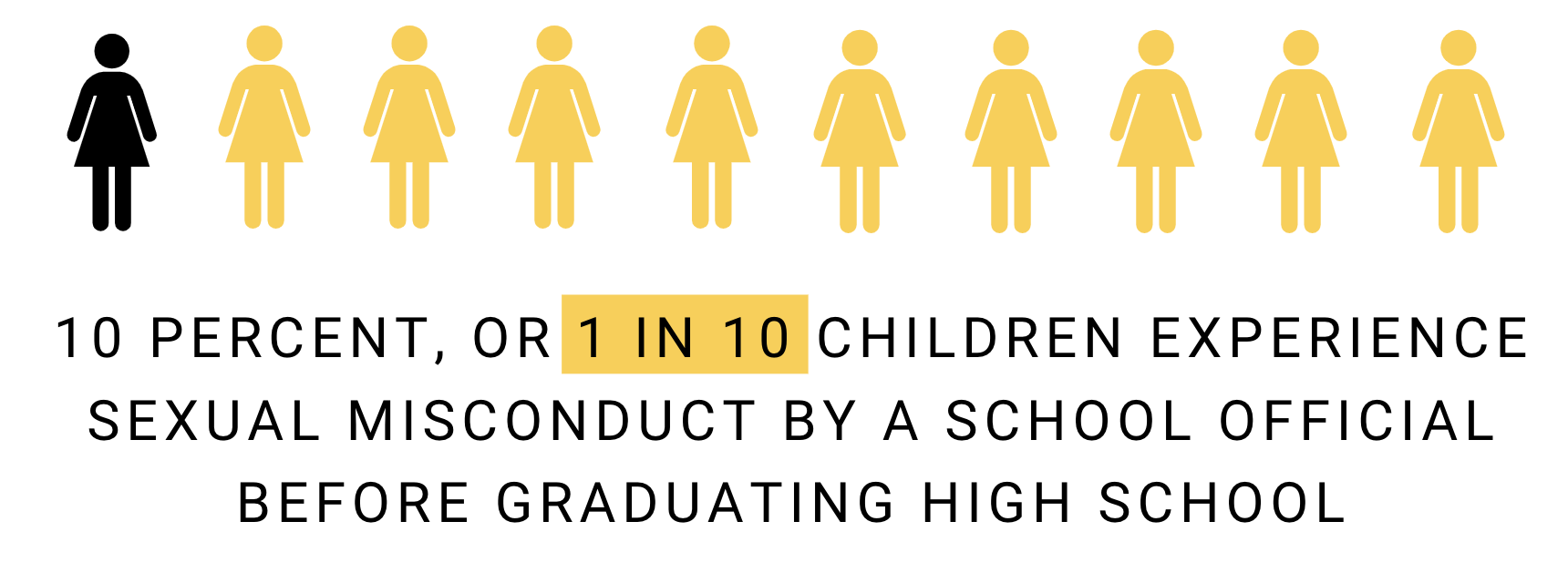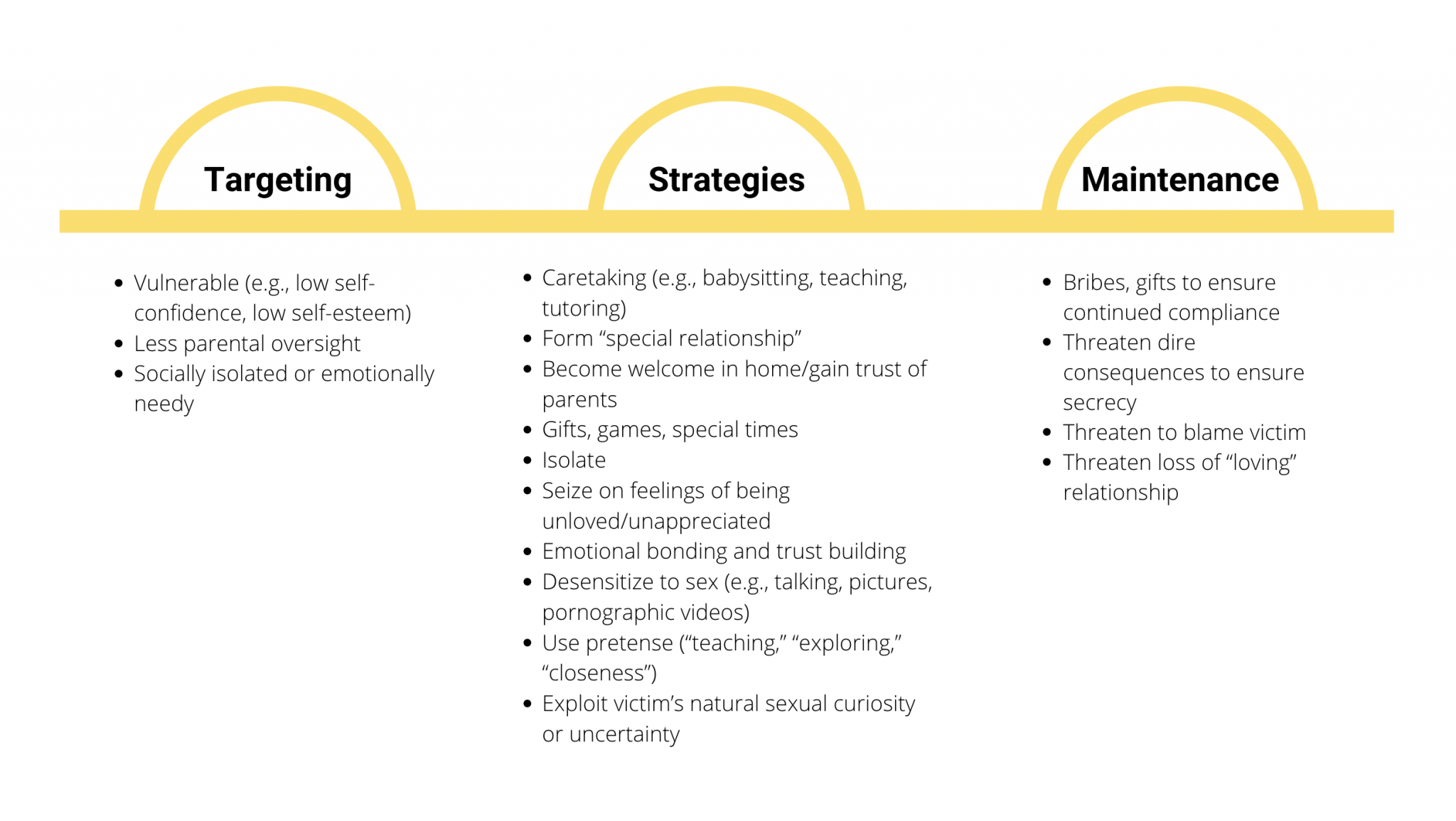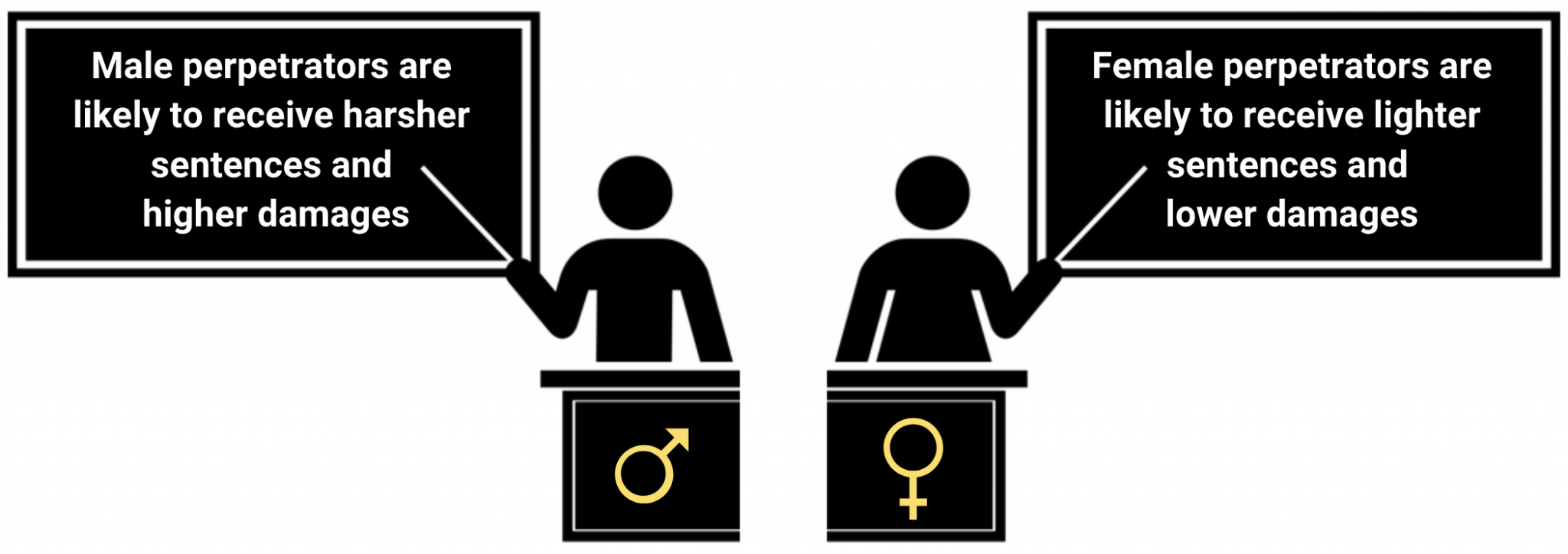DISCLAIMER: Please understand, we believe teachers are incredibly valuable. We greatly appreciate teachers dedicating their lives to educating the next generation, especially because we understand the job is not always glamorous. This post is meant to educate and inform the public about situations that no one ever thinks could happen to their children. Most teachers are amazing human beings who have only our children’s welfare at heart. However, every so often, a predator slips through the cracks in the system. We ask you to use this information as a reference and to stay vigilant with keeping your children safe.
We exist in a culture that spreads fantasies about intimate relationships between teachers and students. Think about it; you could probably name at least one movie or TV show that glamorizes an inappropriate sexual relationship between a teacher and student.
Hollywood glamorizes teachers and students getting together and shows students being cognitively mature enough to agree and even seek out a sexual relationship with a teacher.
Look at Saturday Night Live, one of America’s favorite comedy and sketch shows. A popular SNL sketch, “Teacher Trial with Ronda Rousey,” shows a student excitedly recounting his sexual encounter with two of his teachers. Although the skit intends to be funny, child abuse is not a laughing matter.
In reality, people do not understand what happens in these situations, how teachers can prey on students, the long-term effects on students, that not all victims get the same treatment, or how the power differential between educator and student further victimizes students.
The reality is that sexual misconduct is not glamorous, funny, or harmless. Instead, sexual misconduct between teachers and students is illegal, abusive, and non-consensual.
Sexual misconduct is a real issue and can be a present danger to your children. Understanding sexual misconduct in an education setting can help you stay vigilant in keeping your children safe.
Children Cannot Consent
Why can’t students agree to engage with a teacher sexually? Because of consent.
Consent is when people mutually agree to engage in sexual activity with each other. The “yes” must be given freely, and if one individual wants to stop, the sexual activity ceases. There is no force. There is no coercing. It is a yes or no situation where those participating are intentionally and consciously taking part in that sexual activity; minors cannot give consent.
RAINN, the United States’ largest anti-sexual violence organization, clearly explains situations where consent cannot exist:
Consent cannot be given by individuals who are underage, intoxicated or incapacitated by drugs or alcohol, or asleep or unconscious. If someone agrees to an activity under pressure of intimidation or threat, that isn’t considered consent because it was not given freely. Unequal power dynamics, such as engaging in sexual activity with an employee or student, also mean that consent cannot be freely given.
Age matters when talking about consent, because minors, particularly preteens and younger, do not and cannot fully understand the nature of sexual activity.
The minimum age for consent varies from 16–18 years old based on the state. But even then, it is illegal for a child to agree to sex or cooperate in sexual activity.
A child cannot legally consent to sex, and cooperation does not equal consent.
Cortney Fisher, a criminology and criminal justice professor at the University of Maryland, explains the difference between consent and cooperation. In her book, “Something Bad Happened Last Night: The Study of the Victim’s Role in the Criminal Justice System,” she writes:
Sexual activity that is prohibited by age or relationship is prohibited regardless of the force used against the child or the cooperation of the adolescent or child. Because of the nature of the crime, there is no legal scenario in which a child can “consent” to the activities. However, due to the nature of sexual abuse and sexual assault, some children may appear cooperative. Cooperation, or the appearance of cooperation, may never equal legal consent.
Sexual Abuse vs. Sexual Misconduct
In addition to refreshing your memory about consent, we want to identify and explain the difference between sexual abuse and sexual misconduct. Although those two terms appear to be the same, they are different.
Sexual abuse is illegal criminal sexual behavior by an adult to a minor. According to statute [18 U.S.C. § 2242], sexual abuse occurs when a person forces another to engage in a sexual act by inducing fear. Or sexual abuse can occur if someone engages in a sexual act with someone who is incapable of giving consent or if someone is physically incapable of refusing participation in or communicating unwillingness to engage in that sexual act. This definition includes sexual crimes such as sexual acts with a child, rape, child sexual abuse material, among others.
Sexual misconduct is a broader term that includes sexual abuse and also includes acts that are not criminal but against school ethical codes. In other words, in states where the legal age of consent is 16, it is not technically illegal for a school employee to have sexual contact with a student aged 16. However, sexual contact is prohibited by school policy.
How Often it Happens
In 2004, the U.S. Department of Education released a report that looked at sexual misconduct in the classroom. The report concluded that roughly 10 percent of students experience sexual misconduct by a teacher at some time during their K-12 school experience. Although the report is from 2004, various studies and media reports support its findings.

The Typical Predator
The Policy and Program Studies Service released a report, “Educator Sexual Misconduct: A Synthesis of Existing Literature,” in which they detailed the typical offender. The report explains the typical offender is male, well-liked at school, and likely has been recognized for excellence at their job. The offender could be any kind of school employee: teacher, coach, counselor, principal, or superintendent. The age of offenders average at 28 years old but can range from 21–75 years old. While offenders are frequently male, women can also be perpetrators.
It is worth noting that predators may act differently depending on which age they target. Predators who go after children who are in seventh grade or younger are typically considered especially good at their job and can even be “celebrated” educators. Their reputations as outstanding educators shock school district officials and community members when the abuse is discovered. People cannot believe that such great educators could be abusers. The predators use being “great” at their job as a way to abuse children.
On the other hand, predators who go after children that are in seventh grade or older may not be as “excellent” as teachers who go after younger children. When focusing on these ages, the acts of misconduct are somewhat less planned. Instead, sexual misconduct can be more opportunistic and a result of poor judgment or a “misplaced sense of privilege.”
On the outside, the predator looks like someone good at his or her job, but this person is just a wolf in sheep’s clothes.
The Typical Victim
According to a 2017 case study released by the National Criminal Justice Reference Service (NCJRS), those most likely to fall victim to sexual misconduct by a school employee are female high school students that come from low-income backgrounds. Often, the targeted students appear needy, get picked on, or have an unhappy home life.
Additionally, students with disabilities are more likely to experience sexual misconduct by a school employee than students without disabilities. Among reports that examined sexual misconduct at institutions, 17 percent of targets were students with special needs.
How Could this Happen?
Teachers’ and school administrators’ jobs are to educate and mentor students. Sometimes students require individual attention from a school administrator to learn the material or improve in extracurricular activities. Spending extra time with students is a normal part of the job, yet predators take advantage of their position to abuse children.
The NCJRS case study said it best, “… the same characteristics of teacher-student relationships that help create a successful educational environment can also create a potentially exploitative situation.”
Since the typical victim is often someone who comes from a low-income background or has a less-than-ideal home life, they make the best prey. Students with unmet needs are the easiest to befriend, exploit, and victimize.
Ultimately, predators target a specific type of student, intentionally or opportunistically, whom they can control. The decision of which student to target depends on the student’s compliance and likeliness of keeping the abuse a secret. The way predators get their targets to keep the abuse a secret is through grooming.
Grooming in the Classroom
Grooming is when sexual abusers create a false sense of trust to accomplish their goals of initiating and desensitizing the child to sexual behaviors and keeping it all secret.
Grooming occurs when the abuser targets the child, gains the child’s trust, fills a need in the child’s life, isolates the child, sexualizes the relationship, and maintains control.
In the context of sexual misconduct by educators, grooming might look like the educator giving the child extra attention or opportunities to help them with class material, perfect new skills, and enhance their learning experience. Not only does this serve the abuser’s agenda to gain the child’s trust, but this tactic tricks parents. The scary part is that parents are usually grateful for the interest taken in their child.
To better understand how grooming occurs, we have included a recreation of a table by James Knoll that synthesizes information from “Child sexual abuse prevention: What offenders tell us.”

After being groomed and experiencing sexual misconduct, often, children feel complicit in their abuse. Children can place responsibility on themselves because they did not tell the educator to stop.
Impact of Sexual Abuse on Victims
Sexual misconduct by an educator falls into the category of sexual abuse, which, according to the RAINN, means that survivors could suffer from psychological, emotional, or physical effects.
These effects can include general symptoms of depression, flashbacks, and post-traumatic stress disorder.
Sexual abuse can lead to other ramifications, including self-harm, sexually transmitted infections (STIs), substance abuse, dissociation, eating disorders, pregnancy, sleep disorders, and suicide, among others. Experiencing sexual abuse is not something any child would choose for themselves, yet they must cope with symptoms from the trauma they endured.
As we mentioned earlier, educators groom their target by filling a need in the student’s life. Therefore, educators can assume different roles to play when artificially filling the gap in their target’s life.
For example, when an educator targets a student who needs a parental figure, they take on the role of being a pseudo parent. When the educator becomes a “pseudo parent” and sexually abuses a student, the student can experience the same sense of betrayal and shame that victims of incest experience. Some say that in addition to sexual misconduct having the same long-term effects as incest, the long-term effects of sexual misconduct by an educator is comparable to the long-term effects suffered by people who were sexually abused by therapists or priests.
Even if the student does not experience the harmful effects of sexual abuse right away, that does not mean the student will not experience the negative effects later. Psychiatrist Brian Jacks explains that it is common to not realize the consequences of the abuse until later in life. Jacks continues that realizing that you were taken advantage of will “mess up your life.”
How Gender Impacts Victimization
Girls are four times as likely to be victims of sexual abuse as boys. However, since our culture has glamorized a sexual teacher-student relationship, male victims generally do not receive the same consideration or societal allowance that female victims of sexual misconduct by an educator receive. Sometimes male victims do not get to be victims, and instead, they can be blamed for the abuse or have their victimization brushed off.
People make misplaced judgments about teenage males who are victims of sexual misconduct in the classroom. An argument is that boys are hormonal and that they fantasize about getting with their teachers. People argue that if a boy cooperates or displays evidence of arousal (e.g., ejaculating), then the boy must have wanted to engage with an educator sexually.
We want to make this clear: physiological responses to sex are not voluntary, so responses like erection, lubrication, arousal, or orgasm do not equal consent.
Sometimes predators will leverage the victim’s physiological responses to keep the abuse secret or to minimize their experience (e.g., telling the victim “they liked it”).
Experts in law, psychology, and social work all recognize there is a clear double standard for male victims of sexual misconduct. This unequal treatment spans through schools, courts, and law offices.
For example, when Cameron Clarkson was 16 years old, he was sexually abused by a female 25-year-old substitute teacher and sports coach. The sexual abuse spanned over two months, but when the educator got in trouble, Clarkson was the one who received backlash. People jeered at him about how he was ruining this “poor girl’s” life, and they vandalized his car and home.
A different 16-year-old boy got sexually abused by his 32-year-old female teacher and wrote a suicidal poem after the abuse occurred. He wrote, “I’m sick of life and how I’m lying / I’m sick of this earth and what I’m trying to do.” He expressed suicidal thoughts, yet his abuser received only one month in jail for sexually abusing him.
The fact remains that males are just as much a victim as females—perhaps even more so—because male victims are not heard, and their experience, if believed, is minimized.
A victim of sexual misconduct—regardless of gender—is a victim. Period. It is not acceptable to tell someone their experience is wrong. The negative effects of sexual abuse do not discriminate.
Gender and Sentencing Patterns
There is a difference in sentencing patterns based on the gender of the perpetrator and the gender of the victim.
When the educator is male, and the target is female, the perpetrator is likely to receive a harsher sentence than if the educator is female, and the target is male.

This does not take into account students’ different experiences as male or female targets.
That said, the sentencing patterns and monetary damages have to do with a few different factors, including but not limited to:
- The frequency and type of sexual encounter
- The age of the victim compared to the state’s age of consent
- The suffering displayed by the victim during the investigation
Universal data on sentencing patterns for sexual misconduct by educators does not exist, but lawyers who deal heavily in these cases agree that the sentencing disparity exists.
Catching Predatory Educators
Often, children do not share what happened to them because they fear no one will believe them. The power difference between educator and student is huge, and teachers are often believed over students.
However, when students do report, they are more likely to report sexual abuse over instances of sexual misconduct, including verbal and visual abuse. Instead, students are most likely to report cases of unwanted touching, hugging, kissing, or forced intercourse.
That said, male educators who have abused female students are more likely to get caught than female educators who have abused male students.
The ways male predators and female predators get caught are different as well.
Male predators are more likely to get caught after the victim makes a direct claim, the school administration finds out, or by law enforcement.
Female predators are more likely to get caught because of reports from other students or by the victim’s parent or guardian.
Moving Forward
We encourage you to listen and believe your children if they come to you about experiencing sexual misconduct by an educator. After experiencing sexual misconduct by an educator, there is already so much working against your child:
- Surviving grooming (which can lead to feeling complicit in the abuse)
- The unbalanced power dynamic between educators and students
- Shame and other negative effects of sexual abuse
It takes courage to talk about what happened to them. Reliving trauma can be painful and scary. It is highly unlikely that they would be lying.
Research shows that victims of sexual abuse are highly unlikely to make false accusations.
The National Sexual Violence Resource Center (NSVRC) released a report about false reporting of sexual assault. The findings show the false reporting statistic is between 2 and 10 percent. Furthermore, the percentage is inflated because of inconsistent protocols and definitions of sexual assault, as well as a weak understanding of sexual assault in general.
It is difficult to come forward about what happened to you, and a significant deterrent to coming forward is the fear that you will not get believed. When survivors are not believed, it adds another layer of trauma to an already traumatic experience.
You are your child’s greatest advocate, so it is crucial that you support them, especially when there is a chance others will not.